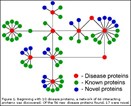Myriad Genetics and Roche Allied Against Cardiovascular Disease

Roche becomes the fourth major pharmaceutical company to initiate a ProNet technology alliance to discover drug targets within disease pathways. Myriad will use the ProNet technologies to develop a biological network of protein interactions and identify potential targets for development of new treatments for cardiovascular disease.
Myriad combines several approaches to its programs of gene discovery and therapeutic target identification including analysis of Utah genealogy databases, protein interaction network analysis, and advanced bioinformatics. Using this approach, the company has discovered the complete sequence of eight major genes, including the BRCA1 and BRCA2 breast and ovarian cancer genes, CHD1 heart disease gene, MMAC1 glioma gene, MMSC1 prostate cancer gene, MTS1 melanoma gene, and MTS2, MTS3 cancer genes. The company has also discovered dozens of new genes that interact in important biochemical pathways through the use of its ProNet technology.
ProNet Technology
ProNet is an industrial-scale system for the discovery of protein-protein interactions, based on the well-established yeast two-hybrid system. Two-hybrid proteins consist of a DNA-binding domain fused to one test protein (the "bait") and a transcriptional activation domain fused to another test protein. Both hybrid proteins are expressed in a yeast reporter strain where an interaction between the test proteins results in expression of special reporter genes.
With ProNet, proteins are initially prepared as two-hybrid baits, using a proprietary, rapid molecular cloning technology. Various protein fragments that encode recognizable motifs, or domains, are specifically amplified and used to create baits. An efficient mating protocol, which uses proprietary strains and vectors, is then used to search each bait against one of Myriad's collection of activation domain libraries. Myriad has created over 15 separate libraries from different tissue types using a proprietary genetic technique that eliminates false positives from the libraries. Positives obtained from these searches are isolated and their identity is determined by sequence analysis.
For each pathway, Myriad runs through ProNet approximately 5 genes, which are believed to function within that specific pathway. This process involves breaking up each gene into its domains and using each domain as a bait to identify interacting proteins. Each interacting protein is itself broken into approximately 5–10 domains, which are then used as baits for the next ProNet run. As it takes about 4 months to run one series of baits through ProNet, Myriad will explore each gene for 3 generations of interacting proteins in one year. The overall result would likely be 20 to 60 interacting proteins.

The Challenge of Functional Genomics
The volume of genetic data being generated through government, academic, and commercial efforts to finalize human gene identification represents a significant opportunity for Myriad. Demand will be increasing for technologies that can distinguish the genes representing valuable opportunities for therapeutic development from the rest of the 100,000 or more genes and gene fragments in public databases. Myriad's ProNet technology is designed to accomplish this task by defining disease pathways through protein interactions. The interactions of expressed proteins represent control points of such processes as cell signaling, aging and programmed cell death. The nodes in the networks are discovered through ProNet and evaluated for their potential to be modified to disrupt the disease process. Those with high potential become drug targets.
Myriad's ProNet technology has already delivered six potential drug targets to the company's collaborators with an additional seven drug targets identified through its own research programs, including a human protein that may form the basis of a novel approach to the treatment of HIV. The Roche collaboration brings the total potential value of ProNet deals to over $143 million, and Myriad's total potential value of all corporate collaborations to $385 million.
Myriad Genetics has established two wholly owned subsidiaries—Myriad Pharmaceuticals Inc., which develops and markets therapeutic compounds, and Myriad Genetic Laboratories Inc., which develops and markets proprietary molecular diagnostic services and has introduced products in the fields of predictive medicine and personalized medicine. The company has established strategic alliances with Bayer, Eli Lilly, Monsanto, Novartis, Roche, Schering AG, and Schering-Plough
For more information: Peter Meldrum, President and CEO, Myriad Genetics Inc., 320 Wakara Way, Salt Lake City, UT 84108. Tel: 801-584-3600. Fax: 801-584-3640.
